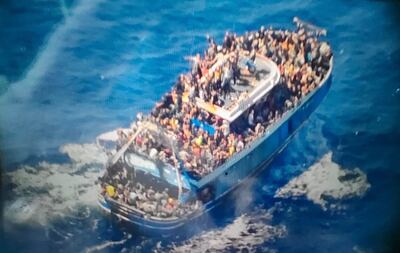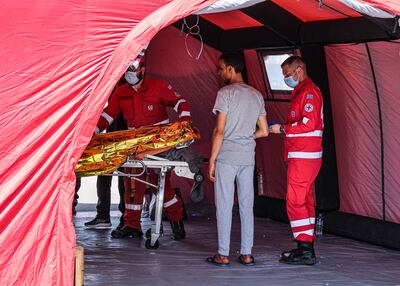About 100 children are feared to have been on board a fishing boat carrying 750 migrants that sank in Greece.
Rescuers were on Thursday continuing to search for survivors as almost 600 people remained missing.
It is thought many women and children were trapped inside the vessel’s hold when it sank.
By Thursday afternoon the official death toll was 78, with 104 having been rescued – most of whom were men including Egyptians, Syrians, Pakistanis, Afghans and Palestinians.
The packed fishing boat, which is believed to have set sail from Libya, capsized and sank early on Wednesday morning in deep waters about 80km from the southern coastal town of Pylos.
Mohamed Abdi Marwan told Reuters five of his relatives were on board, including one 14 year old, but he has heard nothing from them since it sank.
He believes his nephew Ali Sheikhi, 29, is alive, after family members spotted him in photos of survivors, and friends are making their way to Greece.
“Those smugglers were supposed to only have 500 on the boat and now we hear there were 750," he said. "What is this? Are they cattle or humans? How can they do this?”
He said each of his relatives had paid $6,000 for the trip.
British man Aftab Khan, from Wolverhampton, has flown to Greece to find his cousins who were on board. He said one had been found alive but two were still missing.

Dr Manolis Makaris, head of cardiology at Kalamata General Hospital where survivors were being treated, said families of some Egyptian children who were missing had sent him photographs in case he recognised treating them.
"They [the survivors] told us there were children in the bottom of the ship, children and women," he told the BBC.
The incident has led to widespread criticism over Greece’s pushback policy.
"It was a tragedy," Dr Makaris said.
"Everyone in Europe must not accept this situation. We have to do something. Everyone has to do something so it doesn't happen again."
Save the Children, which estimated 100 children were on board, has criticised nations for closing off routes and said the disaster should send a warning to EU governments.
"[EU] member states have gone to extraordinary lengths to close off all routes to children and their families seeking safety in Europe," said Daniel Gorevan, senior advocacy adviser at the charity. "Often their only option is to take dangerous journeys by boat.
"The fact that people continue to die in the Mediterranean should be a wake-up call for EU governments," he said, warning the Mediterranean could soon be "the deadliest migration route in the world".
Dr Makaris said he had been told a similar number of children were on board.
Greece is one of the main routes into the EU for refugees and migrants from the Middle East, Asia and Africa.
Under a conservative government in power until last month, Greece had taken a harder stance on migration, building walled camps and stepping up border control.
Greek authorities say those on board in the latest tragedy had rejected their offers for help.
As the boat began to founder late on Tuesday night, people on the crowded upper deck repeatedly turned down attempted assistance from a Greek coastguard vessel that was shadowing it, saying they wanted to reach Italy, Greek authorities said.
"When you are faced with such a situation ... you need to be very careful in your actions," coastguard spokesman Nikos Alexiou told state broadcaster ERT.
"You cannot carry out a violent diversion on such a vessel with so many people on board ... without any sort of co-operation."
Refugee action group Alarm Phone, which operates a transEuropean network supporting rescue operations, has blamed the pushback policy for the tragedy and says it needs to end.

“It is because people on the move know about the horrible and systematic pushback practices carried out by the Greek authorities, practices that are sanctioned by the EU. Greece has become 'Europe’s shield', it said in a statement.
“People on the move know that thousands have been shot at, beaten and abandoned at sea by these Greek forces. They know that encountering the Hellenic [Greek] Coastguard, the Hellenic Police or the Hellenic Border Guards often means violence and suffering. It is due to systematic pushbacks that boats are trying to avoid Greece, navigating much longer routes and risking lives at sea.
“We have documented innumerable cases of pushbacks and also of cases where overcrowded boats capsized because they took longer routes, trying to avoid Greek forces.
“Stop blaming people on the move for trying to escape your violence, stop blaming people on the move for their own death and stop pushbacks – end death at sea, tear down Europe’s borders.”
The Italian right-wing government, which adopts a hard stance against illegal immigration, in March increased jail terms for human smugglers after a migrant shipwreck in the southern Calabria region claimed at least 94 lives. It has pledged to continue with its approach.
"We strongly believe that the most appropriate way to tackle this is to stop the human smugglers," Interior Minister Matteo Piantedosi said.

"We can only do it together with Europe and the international community."
On Thursday, government sources said the chances of retrieving the sunken vessel, which had set off from the Libyan port of Tobruk, were remote, because the area of international waters where the incident occurred is one of the Mediterranean's deepest.
Aerial pictures released by the Greek coastguard showed dozens of people on the boat's upper and lower decks looking up, some with arms outstretched, hours before it sank. Few were wearing life jackets.
“We are witnessing one of the biggest tragedies in the Mediterranean and the numbers announced by the authorities are devastating,” said Gianluca Rocco, head of the Greek section of IOM, the UN migration agency.
A Supreme Court prosecutor ordered an investigation into the circumstances of the deaths.
Coastguard experts believe the boat may have sunk after running out of fuel or suffering engine trouble, with the movement of passengers inside causing it to list and capsize.
The IOM has recorded more than 21,000 deaths and disappearances in the central Mediterranean since 2014.














